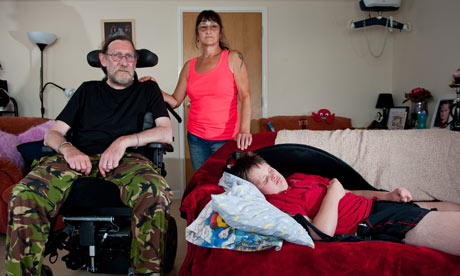People with disabilities are having to curb spending on food and bills after being refused discretionary funding help

Paul, Sue and Warren in the living room of
their house.
Photograph: Aled Llywelyn/Athena Pictures
Nine in 10 disabled people
are being forced to cut back on food or paying household bills after being
refused emergency housing payments to help them pay the "bedroom tax", research
has found.
The report
by the disability charity Papworth Trust shows that almost one in three
disabled applicants are being rejected for discretionary housing payments (DHPs)
from the government fund intended to provide assistance to housing benefit
claimants who are unable to pay a shortfall in their rent.
David Martin, strategy director at the Papworth Trust, says: "The government asked councils to prioritise people with disabilities and long-term health conditions when deciding who should get emergency payments. This simply isn't happening."
Short-term help
Paul and Sue Rutherford had hoped to be awarded a DHP at least for short-term help in making up the £13.50 a week they are losing for having a third bedroom. Though disabled themselves – Paul has a lung condition while Sue has chronic depression – they are full-time carers to their grandson. Warren, 13, has a rare chromosome disorder. He is unable to walk or talk, cannot feed himself, and is doubly incontinent. Their house in west Wales is purpose-built for his needs, with ceiling hoists, wide doorways, a wet room and a third bedroom that allows a carer to stay at weekends when Paul and Sue need respite. Last month, however, the family were rejected for a DHP because the county council judged they had excess income of £99 a week.
"I wish [that were true],"
says Paul. "Pembrokeshire county council has included at least the majority of
Warren's [disability living
allowance, DLA] care component [in that calculation]."
Martin explains: "When
calculating people's income, councils are including DLA to help them sift the
sheer volume of deserving applications for these emergency payments." However,
he says this goes against the advice of the work and pensions minister, Steve
Webb, who has told councils to "disregard
income from disability-related benefits, as they are intended to be used to help
pay for the extra costs of disability".
The consequences of this failure need to be considered in light of wider financial pressures on disabled people, says Hawkes. "The fact is that, in 2013, disabled people are struggling to make ends meet. Life costs more if you're disabled, but living costs are spiralling, income is flatlining [and disabled people] are also facing huge cuts to support that they need."
The Department for Work
and Pensions says reform of housing benefit in the social sector is essential,
and that it is monitoring the changes closely. "We are giving local authorities
£150m discretionary housing payment funding this year to support vulnerable
people, including £25m to help people who live in accommodation that has been
adapted for their disabilities," a DWP spokesman says. "Disability benefits are disregarded
when calculating housing benefit entitlement, and where that income is clearly
earmarked for care and mobility costs local authorities should disregard it in
DHP applications."
Pembrokeshire county council says it has received "a significant number of applications" for DHPs and that every one is considered on its merits. A council spokeswoman says: "In cases where the customer or a member of their household is confined to a wheelchair and resides in a property that is purpose-built or specifically adapted to meet the needs of their disability … the council will only reject an application for a DHP when it appears that the customer has an excess of income over expenditure and is therefore able to meet the rent shortfall. At the customer's request we will review, with them, their income and expenditure to ensure the figures submitted to us are accurate."
Guardian